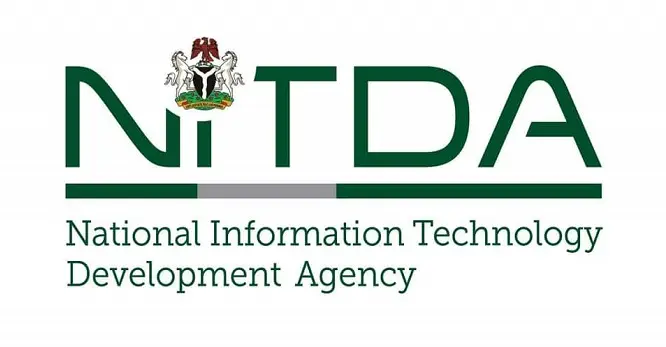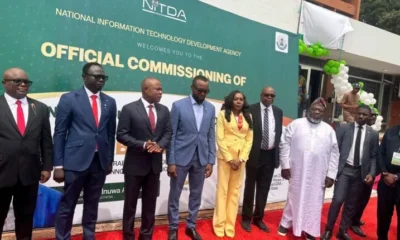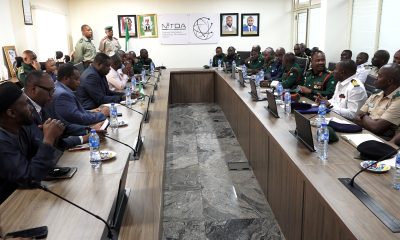ICT
NITDA’s Purview: The Incoming Administration’s Focal Areas for the Growth of the Digital Economy Sector

By Ernest Ogezi
The impact of the digital economy in Nigeria has been astronomical, lifting the country out of recession on two occasions as per the NBS. No other sector has had a greater influence on the Nigerian economy in the past decade. It’s no wonder the new administration has already developed plans and strategies to ensure the sector remains significant and capable of making even greater impacts as we usher in a brand-new administration under the leadership of His Excellency, President Asiwaju Bola Ahmed Tinubu, GCFR. With renewed hopes of economic prosperity, revolutionising the digital sector, improved security, and all-round growth of the country, there is already a manifesto detailing the methods and modalities of consolidating the digital economy for national prosperity. These are the focal areas:
Implement policies that train and build capacity among Nigeria’s large and youthful population to take greater advantage of opportunities in the industry. NITDA is already implementing several youth-focused interventions in the sector to harness Nigeria’s youthful population for tech talent acceleration and position Nigeria as a global IT Talent Factory. The Agency will continue to prioritise the establishment of more strategic training programs that cater to the needs of Nigeria’s young population. These programs will cover a wide range of technical skills, including programming, software development, data analytics, cybersecurity, and emerging technologies such as artificial intelligence, cloud computing, and blockchain. Through the Agency’s One million developers initiative, 215,524 Nigerians have completed or are undergoing related capacity-building programs. Additionally, various multi-sectoral capacity-building programs have been launched to promote digital literacy, with 823,814 individuals trained so far.
Develop and implement innovative strategies and policies to support local funding opportunities and access to capital for start-ups, while also encouraging foreign investors to continue investing in Nigeria. To achieve a thriving and globally competitive start-up ecosystem capable of attracting foreign investments, NITDA has strategically created the Office for Nigerian Digital Innovation (ONDI) as a Special Purpose Vehicle. This aims to implement innovative strategies and policies targeted at supercharging the start-up ecosystem for global competitiveness. Since 2019, the Agency has supported 219 start-ups through various means, including facilitating grants, seed funding, and sponsorships to global events. Furthermore, the Nigerian start-up ecosystem has attracted over USD$4 billion in investments, making it the highest in Africa. NITDA, as the Secretariat for the implementation of the Nigeria Start-up Act (NSA), will continue to collaborate with public and private sector stakeholders to scale up these initiatives, creating a more favourable landscape for the creation of Innovation-Driven Enterprises (IDEs) and start-ups that significantly contribute to national economic growth and prosperity.
These initiatives have created global visibility for Nigerian start-ups and fostered increased foreign investments. As we move forward, NITDA will remain committed to working with relevant stakeholders to scale up these efforts, providing an even more conducive environment for the growth of Innovation-Driven Enterprises (IDEs) and start-ups, which will be instrumental in driving Nigeria’s economic growth and prosperity.
Incentivising value drivers within the start-up ecosystem, such as technology hubs, parks, accelerators, and angel investors, is crucial for fostering a responsive and vibrant entrepreneurial environment. To address the digital infrastructure gaps in Nigeria, NITDA has deployed 601 digital infrastructures, including Digital Economy Centers, IT Hubs, Innovation Parks, and IT Community Centers.
As part of the implementation of the NSA, NITDA aims to partner with and further incentivise incubators, accelerators, and investors to expand initiatives like the TIES Scheme, iHatch Incubation Program, and the Bridge to MassChallenge Nigeria Program, among others. This will strengthen existing collaborations and provide these start-up support organisations with the necessary resources to encourage the growth and expansion of start-up entities in Nigeria.
Investing in infrastructure and transportation is essential for the growth and development of the e-commerce industry. Nigeria currently ranks as the 39th largest market for e-commerce globally, with a predicted revenue of 7.63 billion US dollars by 2023, surpassing Israel. The market volume is projected to reach 11.7 billion US dollars by 2027. Strategic investment in infrastructure and transportation is paramount to fueling the growth and development of the e-commerce industry. As Tinubu’s administration prioritises digital job creation, e-commerce is a promising archetype to realise that. Therefore, NITDA strategically supports e-commerce start-ups to develop innovative solutions that stimulate small and medium-scale entrepreneurship, harnessing the sector’s vast potential.
Promoting local technology equipment manufacturing is a key step toward becoming a digitally independent nation. Developing our own technological products is essential, particularly considering that all digital devices have a backend. Local productivity is pivotal in achieving self-reliance, enhancing technological capabilities, and driving economic growth. NITDA consolidates the geometric improvements already recorded in the indigenous Original Equipment Manufacturers (OEMs) sub-sector by expanding and improving their capabilities and production capacities. So far, NITDA has approved licenses for 12 indigenous OEMs, with the majority having acquired ISO 9001:2015 certification to improve the quality of products. Indigenous OEMs have an annual aggregate sale of nearly a million devices.
Prioritising the implementation of government digital services is crucial to improving the efficiency and functioning of the government. Expanding the e-Government interoperability drive will ensure transparent and fully citizen-centric governance. Upscaling service delivery, fostering transparency, and ensuring seamless interactions between government agencies and citizens will increase the efficiency and effectiveness of the government. This will ensure that Federal Public Institutions (FPIs) are viewed as partners in progress by the citizenry. Through the IT Projects Clearance process, the Agency has successfully assessed and cleared 835 unique IT projects from over 340 FPIs, resulting in saving ₦306.3 billion for the Federal Government. This ensures that the government’s digital transformation investments are effective and aligned with the e-Government Masterplan and the interoperability framework. NITDA has established the Digital Transformation Technical Working Group (DTTWG) to support initiatives aimed at achieving a digital Nigeria. NITDA also leverages the DTTWG to bolster collaborations and further drive the implementation of government digital services in Nigeria.
Encouraging private sector job creation through the provision of development and support services to government agencies is a key objective for NITDA. The Agency recognises the agility and expertise of the private sector in achieving significant results with minimal bureaucracy. By leveraging the private sector’s capabilities, NITDA aims to enhance digital capabilities, optimise service delivery, and create an environment conducive to job growth and economic prosperity. Partnerships between NITDA and the organised digital private sector have facilitated the exchange of knowledge, skills, and resources, enabling government agencies to tap into the private sector’s technological expertise. Through initiatives like the IT Clearance Process, the Agency encourages the patronage of indigenous capacities, resulting in over 3 million new jobs and the potential for many more.
Another crucial aspect is reforming government policies to encourage the prudent use of blockchain technology. By embracing blockchain and consolidating the existing regulatory environment, the new administration, through NITDA, will implement the National Blockchain Policy. This policy aims to unlock the potential of this transformative technology, foster innovation, enhance security and transparency, and facilitate economic growth. Blockchain offers decentralised and tamper-resistant solutions for identity verification, authentication, and secure transactions. Establishing an advisory committee composed of experts from the blockchain industry, technology leaders, legal professionals, and policymakers will play a vital role in reviewing the existing regulatory framework and suggesting changes to create a more efficient and business-friendly environment for blockchain technology and virtual asset services.
Encouraging the Central Bank of Nigeria (CBN) to expand the use of the digital currency, the e-Naira, is another important step. By embracing cutting-edge ICT technologies and leveraging the benefits of digital currencies, the financial landscape can be revolutionised, enhancing financial inclusion and driving economic growth. Blockchain technology provides transparency, immutability, and enhanced security, ensuring the integrity of transactions and safeguarding against fraud. The CBN can foster trust and confidence in the e-Naira by harnessing the power of blockchain, enabling seamless and secure digital transactions. Promoting interoperability and seamless integration of the e-Naira within existing financial systems and digital platforms is crucial for its success. It’s worth noting that NITDA collaborated with the CBN on the e-Naira Hackathon, which aimed to develop innovative solutions for financial inclusion and position the e-Naira as the African gateway to the digital economy.
The Tinubu administration’s plans for One Million jobs in the digital economy are commendable and inspiring. NITDA will remain a vital institution driving change in this sector, deploying the best minds and strategies to ensure Nigeria reaps the maximum benefits of the digital economy. The ultimate goal is to improve the overall economy and enhance the quality of life for Nigerians.
Headlines
NITDA plans to reposition Nigeria’s technology ecosystem – DG

The National Information Technology Development Agency (NITDA) says it plans to reposition Nigeria’s technology ecosystem to emerge as a global digital talent powerhouse.
The Director-General of NITDA, Kashifu Inuwa Abdullahi CCIE, said this on Wednesday at a media parley with the theme “Exceptional Media Relations, Strengthening Bonds Beyond Headlines” in Abuja.
The media parley aimed to discuss NITDA’s Strategic Roadmap and Action Plan (2024-2027).
Inuwa said the roadmap was designed in line with President Bola Tinubu’s eight priority areas targeted at diversifying the nation’s economy.
He added that the Federal Ministry of Communications, Innovation and Digital Economy also rolled out five strategic objectives to achieve development in the IT sector.
The NITDA boss said the agency crafted the eight pillars of the Strategic Roadmap and Action Plan as a comprehensive document that reflected its commitment to uplifting Nigeria to a premier status in the global digital economy.
He said this would be done by harnessing the potential of innovation and entrepreneurship.
Inuwa said the agency had also developed the National Digital Literacy Framework in line with the first pillar, which was aimed at fostering digital literacy and cultivating talents.
According to him, the framework has an ambitious target of achieving 95 per cent digital literacy by 2030, and that can make us surpass India in technology, among other initiatives.
“We are working with the Ministry of Education to review the curriculum across the formal education, from nursery to university so that we can infuse digital literacy in our formal education.
“By doing that, we can empower Nigerians to have digital skills before graduating.
“We are also conceptualising other initiatives which include the Digital Literacy for All Initiative which will be unveiled soon,” the Director-General said.
He added that the initiative would ensure Nigerians were educated on IT outside the formal education and have access to quality digital content.
The Director-General said that apart from digital literacy, the agency was working to ensure digital sovereignty and develop all digital innovation in the country.
He recalled that India started brain export about 20 years ago, adding that “presently, almost 25 per cent of sea level executives in big technology companies are Indians and they have dominated the global technology ecosystem.
“Nigeria can do the same because we have an even more competitive advantage than India. We have the population, better accent, better time zone and if we position ourselves, we can beat India in technology.”
The NITDA boss added that the agency had a mid-term target of achieving 70 per cent digital literacy by 2027.
He said that the strategic plan intended to position Nigeria as a digitally inclined nation in line with the “Renewed Hope Agenda” of the present administration.
ICT
Tijani Reveals $2bn Investment Needed to Expand Fibre Optics Across Nigeria

Tijani Reveals $2bn Investment Needed to Expand Fibre Optics Across Nigeria
In an exclusive interview on Channels Television’s Politics Today program, the Minister of Communications, Innovations, and Digital Economy, Bosun Tijani, disclosed that the comprehensive installation of fibre optics cables across Nigeria would require an estimated $2 billion investment.
During the interview, Minister Tijani also addressed the state of advanced technology in Nigeria, confirming the presence of the Fifth-Generation (5G) network. However, he emphasized that the infrastructure supporting this technology is not universally accessible within the country.
“We do have 5G in some places,” Minister Tijani affirmed. “The infrastructure that drives 5G is not something that is across the nation. So, if you subscribe to 5G and move into locations where the infrastructure cannot support it, the quality will drop. 5G exists in Nigeria, and there are telcos with the license.”
Highlighting the government’s efforts to enhance connectivity, Minister Tijani outlined plans to increase the length of fibre optics cables in Nigeria from the current 35 to 40 kilometres to an ambitious target of 95,000 kilometres. He estimated the cost of this extensive wiring project at approximately $1.5 billion to $2 billion.
With a vision for transformative progress under his leadership, Minister Tijani expressed optimism about achieving the goal of wiring Nigeria within the first four years of the President Bola Tinubu administration. He emphasized the government’s focus on connecting essential institutions, including schools, hospitals, and government offices, to the fibre optic network.
Minister Tijani also discussed ongoing initiatives to declare telecoms infrastructure as critical national assets, aiming to safeguard against vandalism and ensure the sustained development of Nigeria’s digital connectivity landscape.
Tijani Reveals $2bn Investment Needed to Expand Fibre Optics Across Nigeria
ICT
Truecaller appoints Onwuzurike as Country Manager in Nigeria

Truecaller appoints Ogochukwu Onwuzurike as Country Manager in Nigeria
A global communications platform, Truecaller, has appointed Ogochukwu Onwuzurike as Country Manager in Nigeria.
Onwuzurike’s appointment was disclosed in a statement on Friday in Lagos State.
According to the statement, Onwuzurike would be responsible for leading the company’s go-to-market function and managing the end-to-end operations of Truecaller’s expansion in Nigeria.
The organisation added that Onwuzurike would be saddled with the responsibility of negotiating and collaborating with vendors, service providers and local businesses, with the ultimate goal of making Truecaller a household name in Nigeria.
“The appointee has over a decade of prior experience across verticals such as banking, payments, fintech and SaaS, with GlaxoSmithKline, Philip Morris International, Interswitch and MetaMap,” the statement read.
It said that she has a degree in Communications from the University of Nigeria, Nsukka and a Post Graduate Diploma in Digital Business from Emeritus Institute of Management.
The newly appointed Country Manager, according to the statement, said: “A new generation of companies and tools are changing the way we live our lives today.
“On the back of the digital transformation wave across the African continent, there is a need to continue to build the trust, privacy and safety infrastructure. This is what I find fascinating about Truecaller’s mission.
“Creating safe spaces, including digital and communication spaces, is imperative for a prosperous Africa and I am inspired to join Truecaller and other change-makers to build that reality for my continent.”
Nami Zarringhalam, Chairman and Chief Strategy Officer, Truecaller, said that the company would benefit from Onwuzurike’s wealth of experience.
Zarringhalam noted that Truecaller had wanted to add local expertise and regional knowledge in Nigeria, noting that appointing Onwuzurike would enhance those capabilities further.
“We have clear ambitions to further grow the promising African market, by delivering our class-leading caller ID and spam-blocking functionality, as well as cater to the needs of the diverse businesses that operate in the region.
“Truecaller has seen increased growth coming from Africa, Latin America, as well as parts of South-East Asia in 2023.
“During the last quarter, Truecaller surpassed 100 million users outside of India. The ambition, going forward, is to focus on specific markets like Nigeria by recruiting top talent to accelerate the organic growth even further,” Zarringhalam said.
Truecaller appoints Ogochukwu Onwuzurike as Country Manager in Nigeria
-

 Headlines3 years ago
Headlines3 years agoFacebook, Instagram Temporarily Allow Posts on Ukraine War Calling for Violence Against Invading Russians or Putin’s Death
-

 Headlines3 years ago
Headlines3 years agoNigeria, Other West African Countries Facing Worst Food Crisis in 10 Years, Aid Groups Say
-

 Foreign3 years ago
Foreign3 years agoNew York Consulate installs machines for 10-year passport
-

 News10 months ago
News10 months agoZero Trust Architecture in a Remote World: Securing the New Normal
-

 Entertainment3 years ago
Entertainment3 years agoPhyna emerges winner of Big Brother Naija Season 7
-

 Headlines1 year ago
Headlines1 year agoNigeria Customs modernisation project to check extortion of traders
-

 Economy1 year ago
Economy1 year agoWe generated N30.2 bn revenue in three months – Kano NCS Comptroller
-

 Headlines1 year ago
Headlines1 year agoPhilippines’ Vice President Sara Duterte resigns from Cabinet
















